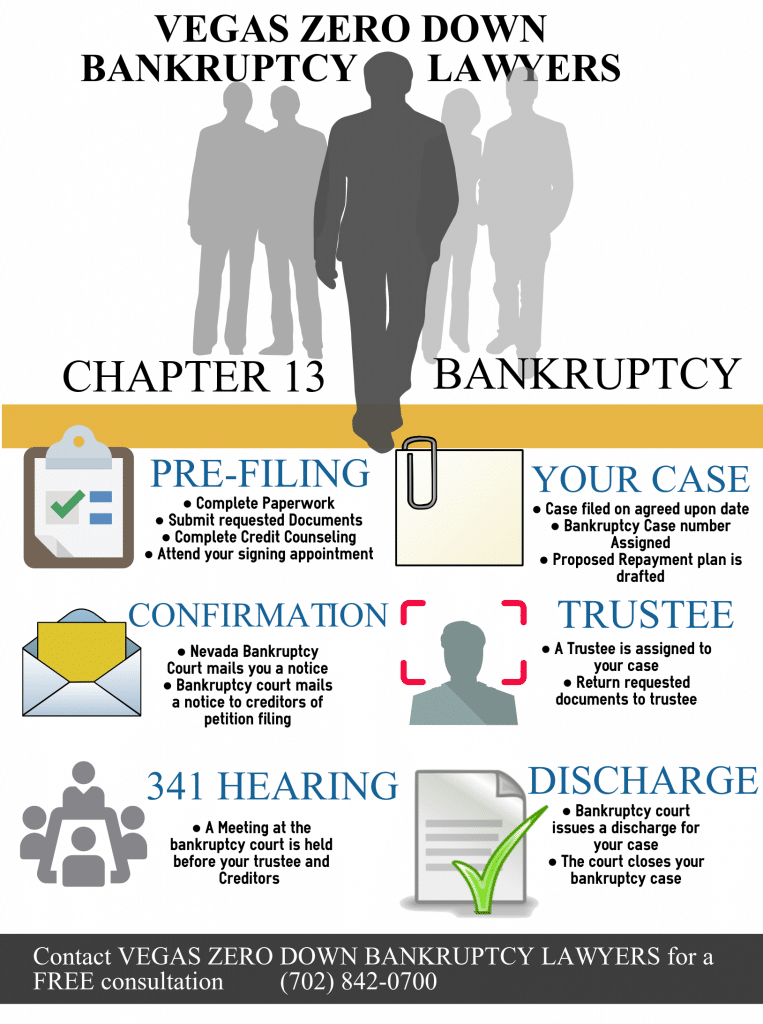
Chapter 13 Bankruptcy
Reno Chapter 13 Bankruptcy Attorneys
Bankruptcy is a complex area of law, and when you find yourself in this situation, you may have questions. Filing for Chapter 13 bankruptcy in Reno is an important decision, but it can be a beneficial debt relief tool to save your home from foreclosure. It can also help you make back-payments to your mortgage, all within a repayment plan that is tailored to fit your financial status and give you the most affordable means of protection.
Declaring chapter 13 bankruptcy in Reno can also eliminate or reduce other sources of debt including medical debt, utility payments, unsecured debt, credit card debut, and certain types of loans. With chapter 13 bankruptcy, you can catch up on tax debt, child support, arrearages and mortgage delinquencies.
Automatic Stay in Chapter 13 Bankruptcy
With a Chapter 13 bankruptcy, an Automatic Stay is put in place which will provide you with protection from collections. After filing for Chapter 13 bankruptcy in Reno, the automatic stay will be put into effect and all creditors must stop the collections process against you. It is a powerful and useful tool that stops all collection actions, as well as wage garnishments, foreclosures, and can protect your property from being repossessed.
There are thousands of debtors throughout Nevada who are in desperate need of the protection that chapter 13 bankruptcy provides, especially because of today’s financial climate. This type of bankruptcy is especially beneficial for those who are behind on mortgage payments or if they have other unsecured debts. By filing for chapter 13 bankruptcy in Reno, you can save your home in a way that also allows you to pay back other debts through the chapter 13 payment plan.
Advantages and Disadvantages of filing Chapter 13 Bankruptcy
- Chapter 13 bankruptcy organizes your debts into one convenient payment plan while Chapter 7 does not require the repayment of debts.
- The repayment length of Chapter 13 lasts anywhere from 3 to 5 years, while Chapter 7 has a shorter term of 3 to 5 months. This is entirely dependent upon your situation, as some debtors need their bankruptcy completed quickly or require their Automatic Stay and its protections to remain in place for as long as possible
- While a Chapter 7 bankruptcy remains on your credit for 10 years, Chapter 13 only lasts for 7 years after filing.
- When debtors are behind on car or house payments, filing for Chapter 13 bankruptcy has the benefit of spreading out the past-due balance over a 3 to 5 year period, making them much more manageable. Chapter 7 only gives you 3 to 5 months to catch up on payments.
- Chapter 13 bankruptcy allows you to keep your property, but this is only allowed under certain state exemptions under chapter 7.
- Under both bankruptcies, opening new lines of credit requires court approval during repayment.
What Chapter 13 Can Do that Chapter 7 Can’t
There are many important differences between Chapter 13 and Chapter 7 bankruptcy. While Chapter 13 reorganizes arrearages on your mortgage, car loan, income taxes, child support, and alimony of the course of your repayment plan, with a Chapter 7, those balances that are past-due must be settled separately. It’s also required to settle those debts before the completion of a Chapter 7 bankruptcy in order to avoid foreclosure, repossession, and other consequences.
Another aspect is to be careful of is cosigners on financed properties such as vehicles. Under Chapter 7, losing those properties to repossession can have a negative impact on your cosigner’s credit. Chapter 13 protects your cosigners from the negative credit reporting that takes place and collection attempts by your creditors.
Chapter 13 also offers the additional opportunities for lien-stripping, which allows you to discharge secondary mortgages if you own more on your home than what it’s worth. Chapter 7 bankruptcy does not afford you this option.
Chapter 13 Eligibility
Under Chapter 13 bankruptcy, eligibility is much less strict than the requirements surrounding Chapter 7. While Chapter 7 requires you to pass a means test or make less than your state’s median income, Chapter 13 does have these same requirements. With Chapter 13, you will need to provide proof that your income will allow you to pay the minimum amount of your debts for your repayment plan.
When filing for Chapter 13 bankruptcy in Reno, you will also have a limit to how much unsecured debts you are able file. With debts such as credit cards and medical bills, they must be less than $394,725, while secured debts like mortgaged homes and financed vehicles must be less than $1,184,200.
I didn’t know how I was going to afford an attorney to file my bankruptcy. Because Nevada Zero Down Bankruptcy offers no money down, I called, set up an appointment, met my attorney, and my bankruptcy was filed — and it didn’t cost me a penny upfront.
I highly recommend this firm. They saved my home. Very helpful throughout my bankruptcy.
Worth Every Penny. Extremely satisfied.
“The most helpful bankruptcy lawyers in Vegas”
Actual $0 Down Bankruptcy!
Made my bankruptcy easy. I was dreading going into the Bankruptcy. They made life easier. Thank you to the great staff at Nevada Zero Down!
“Filed Chapter 7, it went great. Ryan was easy to work with.”
“Very Friendly and Helpful Attorney and Staff.”
“They are the best at what they do. Honest and Affordable.”

Frequently Asked Questions About Chapter 13
LAS VEGAS
5552 Ashley Creek St
Las Vegas, NV 89135
NORTH LAS VEGAS
7251 W Lake Mead Blvd
Las Vegas, NV 89128
HENDERSON
1489 W Warm Springs Rd #110
Henderson, NV 89014




